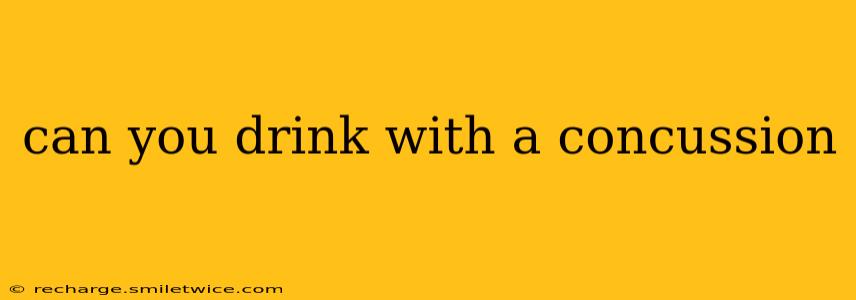Can You Drink Alcohol With a Concussion? The Definitive Answer
The short answer is a resounding no. Drinking alcohol after a concussion is strongly discouraged and can significantly worsen your recovery. Alcohol interferes with the brain's healing process in several ways, potentially leading to prolonged symptoms and even serious complications. This is a crucial point to understand: even a small amount of alcohol can be detrimental.
Let's delve deeper into why consuming alcohol after a concussion is so dangerous and explore some frequently asked questions.
What are the Risks of Drinking Alcohol After a Concussion?
Alcohol is a depressant, meaning it slows down brain activity. After a concussion, your brain is already compromised and vulnerable. Adding alcohol to the mix further impairs its function, potentially exacerbating existing problems or creating new ones. Here are some specific risks:
-
Increased Recovery Time: Alcohol can prolong the healing process, leading to a longer duration of symptoms like headaches, dizziness, nausea, and cognitive difficulties. Your brain needs time and rest to repair itself, and alcohol hinders this crucial process.
-
Worsening Symptoms: Existing concussion symptoms, such as headaches, confusion, and memory problems, can become significantly worse after alcohol consumption. This can lead to a vicious cycle, delaying recovery and potentially causing more severe problems.
-
Increased Risk of Seizures: In rare cases, alcohol can increase the risk of seizures, a serious complication that can occur after a head injury. This risk is significantly amplified in individuals who have a pre-existing seizure disorder or have experienced a severe concussion.
-
Masked Symptoms: Alcohol can mask concussion symptoms, making it difficult to accurately assess the severity of the injury and monitor recovery progress. This delayed diagnosis can have serious consequences.
-
Interaction with Medications: If you're taking medication for your concussion symptoms (e.g., pain relievers), alcohol can interact with these drugs, potentially leading to adverse effects. Always consult a doctor or pharmacist before mixing alcohol with any medication.
How Long Should I Avoid Alcohol After a Concussion?
There's no definitive timeframe, as recovery varies from person to person. However, it's generally recommended to completely abstain from alcohol until a healthcare professional clears you. This could range from several weeks to several months, depending on the severity of your concussion. Rushing back to alcohol before complete healing could undo progress made and prolong recovery significantly.
Can I Drink Alcohol If I Have Mild Concussion Symptoms?
No. Even mild concussions can cause significant brain damage, albeit less visibly so than more severe concussions. The risks associated with alcohol consumption remain the same regardless of the severity of your concussion. It's crucial to err on the side of caution and avoid alcohol altogether until fully recovered.
What Should I Do If I Accidentally Drank Alcohol After a Concussion?
If you've accidentally consumed alcohol after a concussion, contact your doctor or healthcare provider immediately. They can assess your condition, monitor for any worsening symptoms, and provide necessary guidance. It is important to be honest and upfront about your alcohol consumption.
What are the Signs and Symptoms of a Concussion?
Recognizing the signs and symptoms of a concussion is crucial for timely medical attention and appropriate management. Symptoms can vary but may include headache, dizziness, nausea, vomiting, balance problems, confusion, memory loss, sensitivity to light or sound, and changes in sleep patterns. If you suspect you have a concussion, seek immediate medical attention.
In conclusion, avoid alcohol completely after suffering a concussion. The risks significantly outweigh any potential benefits, and prioritizing brain health is paramount for a speedy and complete recovery. Always consult with a healthcare professional for personalized advice and to monitor your progress. Your health and well-being should be your top priority.
